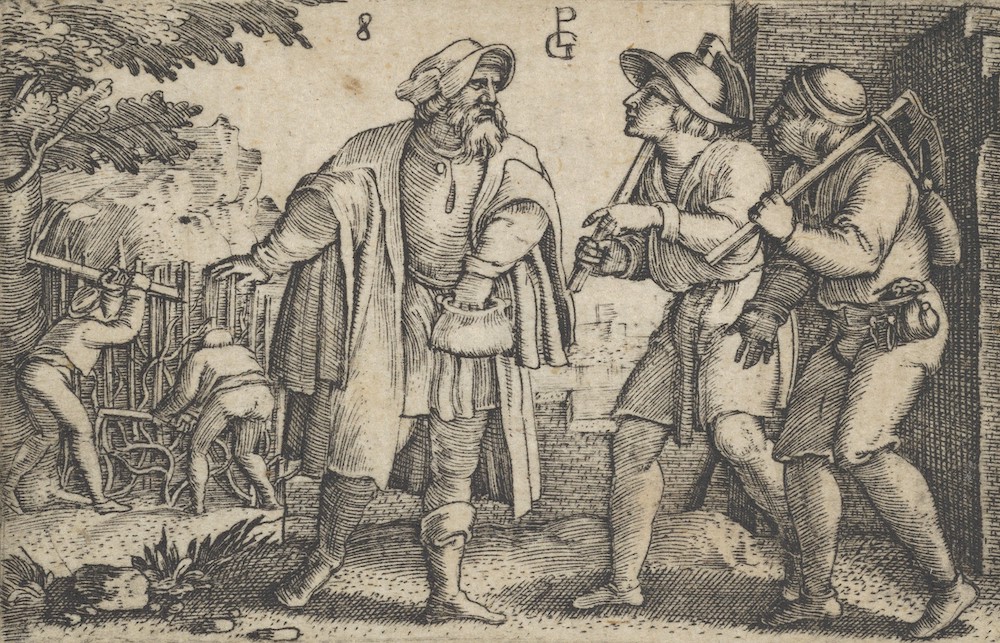
Detail of engraving by Georg Pencz of "The Parable of the Father and His Two Sons in the Vineyard" from "The Story of Christ," 1534-35 (Metropolitan Museum of Art)
"What is your opinion? A man had two sons…" Whenever disciples heard Jesus say that, they were ready for a joke that would jolt. (Parables specialize in startling humor.) Unlike our three-men-went-into-a-bar stories, Jesus' parables didn't end with a punch line that resolves the situation. Parables are the gifts that keep on giving, or better said, stories that keep questioning us.
Some cultural context helps make sense of this story. Jesus came from a collectivist rather than an individualist culture. In collectivist cultures, like that of ancient Israel or many of today's Asian, African, and Latin American societies, people seek happiness through peaceful relationships more than through individual fulfillment. Children are brought up to cherish the good of the whole and especially their family's reputation. This background helps us to capture the nuances of Jesus' story.
Told starkly, here's how the story goes. There was a guy whose father asked him to work for the family. This brazen young man embarrassed his father and disgraced his family by announcing that he would not do it. Then, for some reason, he went out and did it anyway. Later, the dad asked the same of his courteous son. Number two, with all the manners of a page in the king's court, bowed his head and said, "Right away!" and went straight to his room to daydream.
Jesus asked, "Which of these did the will of the father?" The correct answer is, "Both and neither." The momentary will of the father was obviously to care for the vineyard, and the first ultimately did the labor. The father's long-term priority would always be to safeguard the family's reputation, and the second protected that. From the collectivist point of view, peace in the family lasts a lifetime and is more important than a day's worth of work. From the individualist point of view, the son who did the father's work went through a conversion and might be counted on to respect the father sincerely in the future.
A few months ago, moral theologian Fr. Bryan Massingale published an article on NCR entitled "The assumptions of white privilege and what we can do about it." He pointed out that in spite of the individualism that marks U.S. culture, our society operates with some effective collective assumptions. These skew the way everything works, assuring that white people remain privileged above all others. Admitting this is like hanging out our dirty laundry. It's like owning up to the fact that we've built unstable housing in an earthquake zone, but refuse to care because only certain types of people live in them. If we've got enough humility to face the truth and move toward conversion, this admission can lead us to act like the son who said, "No," but then allowed his conscience to move him to do the right thing.
The parable Jesus tells us today applies to U.S. society in unexpected ways. The underlying question this story asks is, "Who shares the father's commitment to the family's well-being?" or, "Who is most like God?" The answer, the same answer that made Jesus' audience choke on their words, was, "the first," the one who eventually labored for the good of the whole family. Polite words, moral-message bumper stickers and pious gestures prove empty when not backed up by committed activities.
Advertisement
No matter how individualist our culture, it is still a culture, a way of organizing our common life. We both inherit and construct our society; we are responsible for it as much as the two sons were responsible for their family property. Those of us benefit from white privilege and refuse to acknowledge it are like the courteous son who accepted all the benefits of being part of the family, but refused to take responsibility for its welfare.
Today, voices like Massingale's are speaking in the name of God the father. They are calling all of us, but especially the privileged, to take responsibility for our society. Massingale calls on white people to do the work of confronting racist jokes, attitudes and policies, saying that real change will not happen "until white people call out white people." He challenges Catholics to hear Pope John Paul II's challenge calling U.S. citizens to, "be unconditionally pro-life," which includes eradicating "every form of racism" from our society. Massingale explains that this implies that "you cannot vote for someone who is racist, mocks people of color, separates Latino families and consigns brown children into concentration camps, and call yourself 'pro-life.' "
Today's reading from Philippians tells us that if we are willing, we can take on the attitude of Christ. In our context, that means that we can grow beyond grasping at privilege. Today's Gospel is meant to jolt us as it asks, "What is your opinion?"
[St. Joseph Sr. Mary M. McGlone serves on the congregational leadership team of the Sisters of St. Joseph of Carondelet.]
